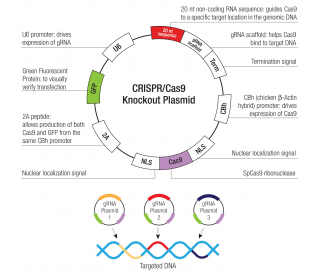Purity
>90%, by SDS-PAGE visualized with Silver Staining and quantitative densitometry by Coomassie® Blue Staining.
Endotoxin Level
<0.10 EU per 1 μg of the protein by the LAL method.
Activity
Measured by its ability to bind Recombinant Human NKG2D/CD314 Fc Chimera (Catalog # ) in a functional ELISA.
Source
Mouse myeloma cell line, NS0-derived
Human ULBP-2
(Gly26-Ser217)
Accession # Q9BZM5IEGRMD Human IgG1
(Pro100-Lys330)N-terminus C-terminus Accession #
N-terminal Sequence
AnalysisGly26
Structure / Form
Disulfide-linked homodimer
Predicted Molecular Mass
48 kDa (monomer)
SDS-PAGE
60-65 kDa, reducing conditions
1298-UL |
| |
Formulation Lyophilized from a 0.2 μm filtered solution in PBS. | ||
Reconstitution Reconstitute at 100 μg/mL in sterile PBS. | ||
Shipping The product is shipped at ambient temperature. Upon receipt, store it immediately at the temperature recommended below. | ||
Stability & Storage: Use a manual defrost freezer and avoid repeated freeze-thaw cycles.
|
Background: ULBP-2
ULBP-2 is a member of a family of cell-surface proteins that function as ligands for human NKG2D. ULBP-2 has also been described under the names RaeT1H (retinoic acid early transcript), NKG2DL2, and ALCAN-alpha. The name ULBP-2 derives from the original identification of three proteins, ULBP-1, -2, and -3, as ligands for the human cytomegalovirus glycoprotein UL16; they were designated UL16 binding proteins (ULBP). The gene for ULBP-2 resides in a cluster of ten related genes, six of which encode potentially functional glycoproteins. Amino acid sequence identity within this family ranges from 30 – 60%. These proteins are distantly related to MHC class I proteins, but they possess only the alpha 1 and alpha 2 Ig-like domains, and they have no capacity to bind peptide or interact with beta 2-microglobulin. Some family members, including ULBP-2, are anchored to the membrane via a GPI-linkage, whereas others have transmembrane domains. ULBP-2 and several other family members are known to bind to human NKG2D, an activating receptor expressed on NK cells, NKT cells, gamma δ T cells, and CD8+ alpha beta T cells. Engagement of NKG2D results in the activation of cytolytic activity and/or cytokine production by these effector cells. The ULBPs are expressed on some tumor cells and have been implicated in tumor surveillance.
References:
Cosman, D. et al. (2001) Immunity 14:123.
Kubin, M. et al. (2001) Eur. J. Immunol. 31:1428.
Sutherland, C. et al. (2002) J. Immunol. 168:671.
Steinle, A. et al. (2001) Immunogenetics 53:279.
Sutherland, C. et al. (2001) Immunol. Rev. 181:185.
Pende, D. et al. (2002) Cancer Res. 62:6178.
Radosavljevic, M. et al. (2002) Genomics 79:114.
NKG2D and its Ligands (2002) www.rndsystems.com.
Long Name:
UL16 Binding Protein-2
Entrez Gene IDs:
80328 (Human)
Alternate Names:
ALCAN-alpha; N2DL2; N2DL-2; NKG2D ligand 2; NKG2DL2; RAET1H; RAET1HNKG2DL2; retinoic acid early transcript 1 H; Retinoic acid early transcript 1H; UL16 binding protein 2; UL16-binding protein 2; ULBP2; ULBP-2










